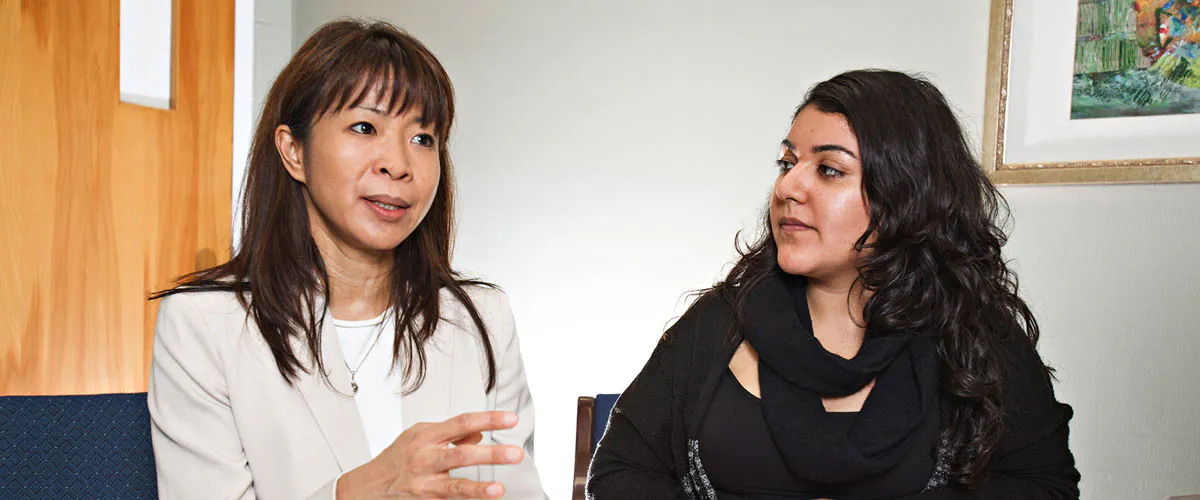For many Georgia residents, finding mental health care can be difficult—especially in rural areas of the state.
In fact, almost every county in Georgia is facing a significant shortage of mental health professionals with only eight psychiatrists for every 100,000 residents, according to the American Academy of Child and Adolescent Psychiatry.
To expand the geographic reach of Georgia's behavioral health workforce, researchers at the University of Georgia will train students to deliver mental and integrated behavioral health services, both in-person and remotely, in high-need areas of the state.
"This grant will use innovative technologies to expand training experiences and support interdisciplinary treatments," said principal investigator Bernadette Heckman, a professor in the UGA Mary Frances Early College of Education. "Students will be trained in and have the opportunity to conduct group teletherapy, a treatment modality likely to become increasingly common in the future."
Teletherapy training
Heckman's $1.9 million grant from the Human Resources and Services Administration will provide graduate students with innovative training opportunities through Georgia's statewide Tele-ECHO Network, a resource housed in the Georgia Department of Public Health that virtually links interdisciplinary specialist teams to serve rural and underserved communities.
A new Tele-ECHO group will be created specifically for the program to bring student-trainees and health professionals together for key interdisciplinary trainings at a large number of experiential learning sites, including medically underserved rural areas; communities with racially-, linguistically- and economically-diverse clients; crisis centers; AIDS service organizations; K-12 and specialty schools; residential and outpatient substance use treatment settings; and more.
"Because of our already well-established telehealth training program structure, our team can continue to implement all planned training activities regardless of the trajectory of COVID-19," said Heckman. "Even if future waves of COVID-19 infection occur, we can use our resource-rich telemental health platform and the state's telemedicine network for experiential training purposes."
Using the telemental health platform, students will develop expertise in remotely assessing, diagnosing and delivering integrated interventions for youth and adults with psychological and behavioral disorders, as well as conducting group teletherapy.
These skills will ensure graduates of the program receive intensive holistic training and integrated behavioral health care as COVID-19 prompts more practitioners and training programs to conduct virtually-administered treatments.
Understanding trauma
With the help of faculty in the School of Social Work, Heckman's project will develop a new training curriculum to cover trauma and trauma-informed care.
According to Jennifer Elkins, co-principal investigator and an associate professor in the School of Social Work, trauma-informed care has become a popular buzzword, but there are gaps in people's ability to understand and address trauma, particularly the intersection of trauma, substance abuse, physical health and mental health.
"It's really important for all organizations and all social service sectors to understand trauma and work from a trauma-informed perspective," said Elkins. "But my big concern is that we have these hospitals, schools and other institutions that can understand and recognize it, but now we need the mental health professionals who are able to treat the trauma that all these other people are recognizing."
The training grant will expand and maximize experiential learning opportunities in multiple areas, giving graduate students in both counseling psychology and social work supplemental opportunities to interact and learn about interprofessional education and collaboration.
"Most folks are working in interdisciplinary settings, but what happens is we tend to silo off," said Elkins. "It is essential that we have a common language and common understanding of what we all do and that we're all working collaboratively together, ensuring everyone has access to services."
Other researchers on the grant include professors Rosemary Phelps and Jolie Daigle and associate professor Amanda Giordano in the College of Education and Orion Mowbray in the School of Social Work.
